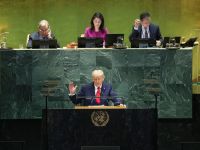The relentless plunge of the euro, which has left economists worldwide scratching their heads in wonder and concern, has particularly hurt Turkey's trade with Europe.
The new common currency of 11 European Union "eurozone" nations - 12 when Greece joins in January - has lost roughly one-third of its value against the U.S. dollar since it was launched in January last year.
Analysts do not agree how long the drop will last, or whether it should be blamed on dimmer growth prospects for the eurozone, a lack of political unity behind the currency, or on the European Central Bank.
Meanwhile, a nominal exchange rate anchor introduced by the Central Bank this year has worsened the impact of the euro's free-fall on Turkey's trade, academics said. The EU is Turkey's major trading partner and buys more than half its exports.
The composition of the foreign currency basket which Turkey has pegged to the lira is also crippling its competitiveness, they said. "The euro's weight in the foreign currency basket is less than that of the dollar, which increases the negative impact," said Faruk Selcuk, economics professor at Bilkent University in an interview with the semi-official Anatolian news agency.
As part of the government's disinflation program, the Turkish Central Bank targets a 20 percent lira depreciation against a foreign currency basket of $1 and 0.77 euros this year. "It does not matter in which currency the contracts are denominated. What matters is price differences resulting from exchange rates between Turkey and the country that buys its exports, and Turkey's exports are getting relatively more expensive due to the euro's fall," Selcuk said.
At the same time, the value of Turkey's exports is going down along with the value of the euro, which widens the foreign trade deficit, thereby deteriorating the external accounts. "Exchange rate depreciation is limited to 20 percent, but inflation is expected to reach 35 percent by the end of the year. That has already been distorting Turkey's international trade, and the euro's plunge is further hurting Turkey's competitiveness," said Professor Esfender Korkmaz of Istanbul University.
The Central Bank plans to deviate from the pre-announced exchange rate path by mid-2001, after which it will allow the lira to depreciate within a gradually widening band. "Until then the risk of a crisis in the Turkish economy will remain," Korkmaz told the Anatolian. "The biggest financial crisis in Turkish history back in 1994 was caused by an over-appreciation of the lira in 1993. The same thing befell Mexico in 1995. The Southeast Asia crisis was sparked by Thailand, which adopted a fixed exchange rate policy in 1997.
Meddling with exchange and interest rates always brings the risk of crisis." It appears, however, that exporters have developed the means to fight competitiveness losses arising from the euro's fall. "Labor productivity has increased significantly in the first half of the year, partly offsetting the competitiveness loss due to lira over-valuation," Selcuk said. Korkmaz argued that Turkey could have offset the competitiveness loss if it was not for the nominal anchor on exchange rates.
"The Central Bank could have intervened to stop the euro's fall in the domestic market through a realistic exchange rate policy. But now its hands are tied," he said. "Still, it is a mistake to allow the dollar to have more weight in the currency basket.
"The Central Bank may be considering the composition of Turkey's external debt when allowing it, but foreign trade balances should matter more."–(Albawaba-MEBG)
© 2000 Mena Report (www.menareport.com)







